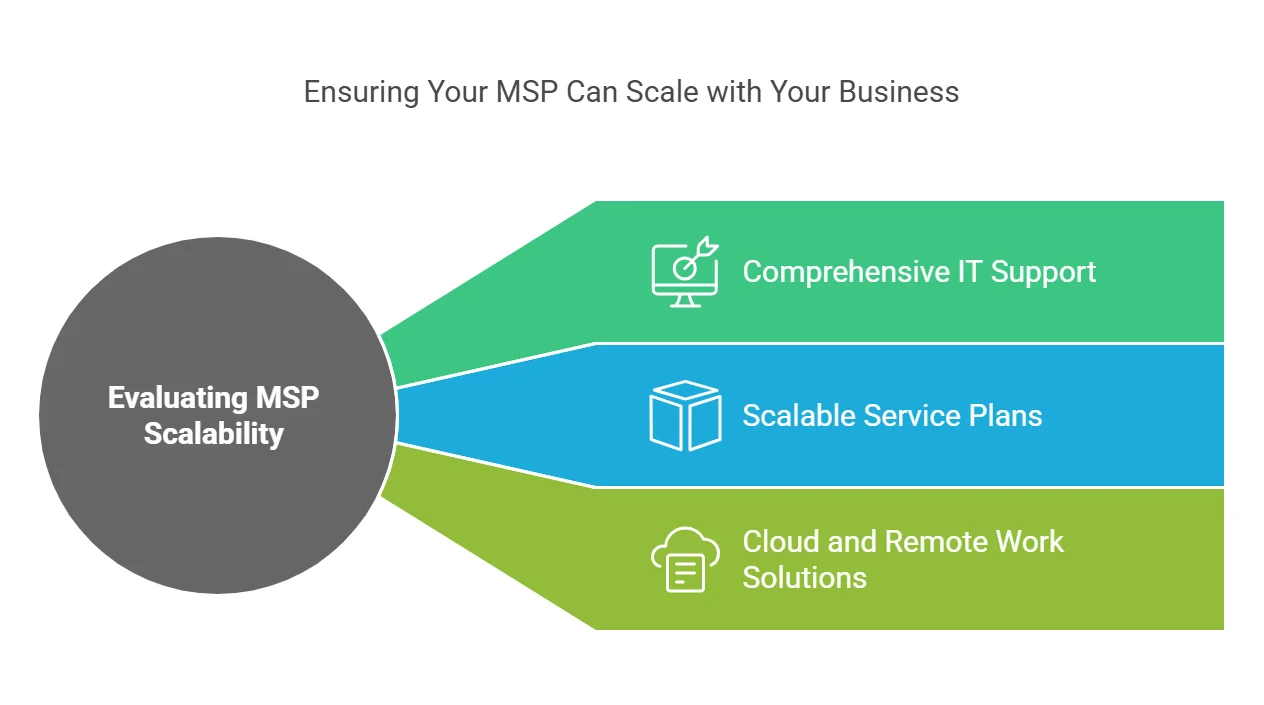IT issues can cripple business operations, leading to downtime, security breaches, and financial loss. A poorly chosen Managed Services Provider (MSP) can be just as damaging as having no IT support at all. “Over 60% of small businesses close within six months of a cyberattack.” Many of these breaches happen due to poor IT management, lack of proactive monitoring, or misconfigured security protocols—mistakes an MSP should prevent.
| As Anthony Moussa, President, MooIT Solutions says, “A great MSP is not just an IT vendor; it’s a technology partner that drives business success by proactively managing IT infrastructure and security.” |
If you’re wondering how to choose a managed services provider, this guide will walk you through key considerations, from evaluating expertise to ensuring transparency in service agreements.
Stop Wasting Time on IT Headaches!Get expert support that keeps your business running smoothly. |
Key Factors to Consider When Choosing a Managed Service Provider
In this blog, we’ll break down the essential factors to evaluate when selecting a Managed Service Provider (MSP).
From their expertise and service offerings to their security measures and cost transparency, understanding these key elements will help ensure that you make an informed decision that aligns with your business needs.
Understanding Your IT Needs: Where Does Your Business Struggle?
Before selecting an MSP, take a step back and assess your current IT challenges and goals. Many businesses choose managed IT services when:
- Their internal IT team is overwhelmed or lacks the expertise to handle cybersecurity, cloud infrastructure, or complex networks.
- They experience frequent downtime, slow response times, or unresolved IT issues.
- They must meet industry compliance regulations like HIPAA, SOC 2, or PCI-DSS.
- They want to scale IT support as the company grows, without hiring a full in-house IT team.
The best approach is to define which IT functions you want to outsource and what level of service you expect. This will help in comparing MSPs effectively.
Industry Experience and Certifications: Do They Have the Right Expertise?
Not all MSPs are created equal. Some specialize in general IT support, while others focus on cybersecurity, cloud services, or industry-specific IT management. When evaluating an MSP, check their:
- Industry-Specific Expertise – If you’re in healthcare, finance, or legal sectors, your MSP should understand the compliance and security requirements for your industry.
- Certifications and Compliance Standards – Look for SOC 2, ISO 27001, HIPAA compliance, or other industry-recognized certifications. These validate an MSP’s ability to handle sensitive data securely.
- Case Studies and Client Testimonials – A reputable MSP should have documented success stories showcasing how they’ve improved IT efficiency, security, and scalability for businesses like yours.
If an MSP lacks experience in your industry, you might face compatibility issues, regulatory risks, and longer resolution times.
Service Offerings and Scalability: Can They Grow with Your Business?
A common mistake businesses make when choosing an MSP is selecting a provider that only meets their current needs, rather than their future growth requirements. When evaluating an MSP, ensure they offer:
- Comprehensive IT Support – Your MSP should cover network monitoring, cybersecurity, cloud management, data backups, disaster recovery, and helpdesk support under one roof.
- Scalable Service Plans – Ask whether they offer customized solutions or force you into fixed service packages. A good MSP adapts to your business size, industry, and budget.
- Cloud and Remote Work Solutions – If your business is shifting towards cloud infrastructure or hybrid work environments, the MSP should have expertise in Microsoft 365, AWS, Google Cloud, or other relevant platforms.
MSPs that lack scalability can become a bottleneck, making it difficult to expand IT operations efficiently.

Support and Response Times: Will They Be There When You Need Them?
One of the most important aspects of choosing an MSP is their service level agreement (SLA)—which defines response times, uptime guarantees, and escalation procedures. Slow or unresponsive IT support can result in lost productivity and frustrated employees. Did you know that in enterprises, the cost of downtime is valued at over $1 million per hour and can reach $5 million, excluding fines or penalties.
Ask these MSP qualifying questions before signing a contract:
- What are your average response and resolution times for critical IT issues?
- Do you provide 24/7 support, or only business-hours support?
- How do you handle emergency incidents and after-hours support?
- Can you provide on-site support if needed, or is everything remote?
Reliable MSPs offer proactive IT management, meaning they prevent issues before they occur, rather than just reacting to problems.
Security and Compliance: Can They Protect Your Business from Cyber Threats?
If you’re specifically looking for how to choose managed security services, security should be a top priority when selecting an MSP. On average, there is a hacker attack every 39 seconds. Data breaches and cyberattacks are growing more sophisticated, and your MSP should provide robust protection, including:
- Endpoint Detection & Response (EDR) to safeguard laptops, servers, and mobile devices.
- Network Security Solutions, including firewalls, intrusion detection, and zero-trust architecture.
- Regular Security Audits to identify vulnerabilities before cybercriminals exploit them.
- Compliance Management for industry standards like GDPR, HIPAA, SOC 2, and PCI-DSS.
Before committing, ask technical questions to qualify an MSP about their security protocols, incident response plans, and disaster recovery capabilities.
| More articles you might like: |
Pricing and Cost Transparency: Are There Hidden Fees?
MSPs use different pricing models, and understanding managed services vendor selection criteria can help avoid unexpected costs. Typical pricing structures include:
- Fixed Monthly Fees – Predictable pricing with all-inclusive services.
- Per-User or Per-Device Pricing – Flexible but may increase costs as you scale.
- Pay-as-You-Go – Ideal for businesses that need occasional support but can be costly for ongoing needs.
Always ask:
- What’s included in the pricing, and what costs extra?
- Are there long-term contracts or month-to-month flexibility?
- What happens if the MSP fails to meet SLAs—do you get service credits or refunds?
Transparency in pricing ensures you don’t get locked into hidden fees or unexpected charges.
Questions to Ask During MSP Discovery: Evaluating the Right Fit
During the evaluation process, use these questions to ask an MSP to determine whether they align with your business needs:
- How do you proactively monitor and prevent IT issues?
- Can you provide client references in my industry?
- How do you handle data backups and disaster recovery?
- What’s your average time to resolve IT issues?
- Do you offer cybersecurity training for employees?
These questions to ask IT MSP providers ensure you’re choosing a partner that prioritizes long-term IT success, not just troubleshooting issues.
Finalizing the Contract: What to Look for Before Signing
Before committing to an MSP, carefully review the contract terms. Key elements to check:
- SLAs – Ensure the response and resolution times are clearly defined.
- Exit Clauses – If the MSP underperforms, how can you terminate the contract?
- Scope of Services – Confirm what’s included in your plan to avoid unexpected add-ons.
A well-drafted contract should align with your business needs and provide flexibility as your company evolves.
Key Factors to Consider When Choosing an MSP
| Factor | Why It Matters | What to Look For |
| Innovation & Future Readiness | Ensures your IT stays ahead of industry trends. | MSP invests in AI, automation, and emerging tech. |
| Proactive Threat Intelligence | Prevents security breaches before they happen. | 24/7 threat monitoring, AI-driven detection. |
| MSP’s Vendor Partnerships | Impacts the quality of IT solutions provided. | Certified partnerships with Microsoft, Cisco, AWS. |
| Client Retention Rate | Indicates reliability and customer satisfaction. | Look for MSPs with 90%+ retention rates. |
| Training & Employee IT Support | Reduces downtime caused by human error. | MSP provides regular cybersecurity training. |
| Onboarding & Transition Process | Ensures a smooth shift from previous IT setup. | A documented, step-by-step onboarding plan. |
| Disaster Recovery Testing | Determines how quickly you can recover from failure. | MSP performs quarterly or annual disaster drills. |
| Customization & Flexibility | Avoids paying for unnecessary services. | Tailored service plans instead of rigid packages. |
Choose an MSP That Drives Business Growth
According to an article by CloudSecureTech, managed services can cut your IT costs by 25% and increase your operational efficiency by 50%. Selecting an MSP is more than just hiring an IT support provider—it’s choosing a strategic partner for business growth. Whether you’re evaluating managed services selection criteria, ensuring cybersecurity protection, or comparing pricing models, every step in the process matters.
Moo IT Solutions is a leading managed services provider, offering proactive IT management, cybersecurity solutions, and scalable technology support. Contact us today to discuss how the right MSP can transform your IT operations and protect your business from costly disruptions.
|
Proven IT Services Near You in Newark
|



